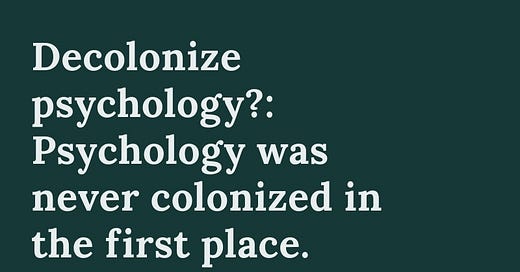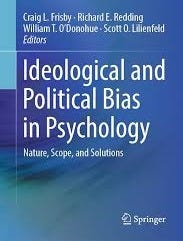Decolonize psychology?: Psychology was never colonized in the first place.
Psychological science already has had a left wing bias in the social and cultural branches of the profession. Saying that it needs to be decolonized is an Orwellian absurdity.
This is a guest post from psychological scientist Lawrence Patihis, a member of the Centre for Heterodox Social Science at Buckingham University, and a senior lecturer at University of Portsmouth. His Substack is here: https://substack.com/@lawrencepatihis
The meme “decolonize psychology” peaked around the year 2020, as did other absurdities. Around that time some decolonization activist(s) advocated for its inclusion in British Psychological Society (BPS) literature, and soon after BPS accreditation often would involve assessors asking universities what they are doing to decolonize their curriculum. This catchphrase’s popularity has waned enormously since, especially in private discussions with other academics, and I would not be surprised if the phrase is quietly retired soon at BPS. I hope to help nudge it towards retirement with this article.
The trouble is this is all a terrible mistake. A self-immolating mistake because it denigrates and politicizes the whole beautiful catalogue of psychological science. Behind the catchphrase is a dark logic: that the science of psychology is part of a conspiracy of colonization, and is essentially bad. It is a conspiracy theory that will not inspire high enrolment in psychology courses. Why would an 18 year old enroll to learn a colonial power manipulation? My argument is that no, psychological science is absolutely brilliant, not colonized, and people should enroll to learn critical thinking, science, and the important findings of psychology that will enrich people’s lives.
Psychological science, in fact, is actually a beautiful science. Students should be encouraged to master it, to love it, and to have high level careers in it. It leads to a wonderful life, and it benefits society. Psychology is not oppressive, nor has it been oppressive in general. Even the first 50 years of psychology (1890 to 1940) can be generally categorized as neutral politically, usually progressive for their times, and certainly nothing to do at all with colonialism.
But what we usually cite in psychological science today is the vast amount of research done since about 1958. Almost all of that is either neutral politically, or with some left wing bias. In social and cultural research since these times, it has almost always been biased towards the left wing, and has never supported colonialism. So in effect, the decolonize-psychology movement is asking us to politicize a subject that is already biased in the same direction that the activists want us to go in. Only now, they want psychology to move from the neutral and the slight-left-wing-bias, and go full on far-left activist. With this comes a requirement to express absurdities, such as not only saying psychology is colonized, but also to take action to undermine trust in mainstream psychological science, and to replace it with activist literature about decolonization. The absurdity of it all is that while psychological science can be criticized, it is much more scientifically justifiable than the decolonization rhetoric. So we are in the position that extraordinarily poor scholarship in postcolonial theory, and poorly trained academics, making demands of a relatively better set of scholarship, research, and scientists. It is the equivalent of those with poor musical ability demanding great musicians change their techniques.
No.
There is a good deal of value in being literal-minded if you are in a scientific discipline, such as the scientific branch of psychology. What does it mean to decolonize a set of ideas? We know what colonization of a country meant—it meant invasion and the imposing of culture and technology. There was a lot wrong about it, and many of us are glad to see the end of it. So the word colonize has a deeply negative connotation in academia. I share that negative view, as an old-school liberal. So it is a powerful rhetorical tool to say that psychology is colonized. It very basically implies that the findings and articles in psychology are deeply and conspiratorially flawed and in need of revolution or being dismantled.
No.
One needs to be literally minded on the question of what does “curriculum” mean in the term “decolonize the curriculum?” Curriculum in academia has come to mean the planned subject matter taught in a course. In psychology, the curriculum consists of topics such as statistics, research methods, social, cognitive, developmental, forensic psychology, etc. Now we are getting specific, which is precisely how we must fight this pseudoscience.
Let us pick one of these: What EXACTLY is “colonized” in statistics? Be specific. Provide concrete examples. The political-types in the field may say that a statistician in 1887 once said something in favour of something very bad. Ok, but what about in 2024? What EXACTLY does it mean to say psychological statistics is colonized?
The activists will not be able to answer properly. But it also raises the question: if you do not like the statistical methods in psychology, perhaps do the hard work of improving them, or may I suggest leaving the field if you think it is a colonial conspiracy. Surely psychology should not let those that hate the field come to dominate it, and then demand the rest of us to repeat political catch phrases. If you think psychological science or empiricism is bad, you clearly have not been educated properly or you do not understand key parts of it. Such people should leave the field, so that those of us that remain can teach the beauty of it to students, including critical thinking, that will benefit both students and society.
Surely there is a danger that the politicization of psychology might put off centrist and conservative students and parents. Surely making the argument that the psychological science literature is “colonized” will even put off students on the left. Why master psychology if it is a conspiratorial tool of oppression? No one, whether left, centre, or right, will be especially motivated by any of this pseudoscience. In fact, if the morals of psychological science include truth, empiricism, and logical argument, then “decolonize-the-curriculum” will do little more than de-moral-ize students and academics. Decolonize-rhetoric often attacks core morals that most good scientists love and believe in.
But let us end positively. Psychological science is not bad. It is not colonized. In fact, the replicated scientific branch has discovered some wonderful things that have helped raise thriving. We have discovered that authoritative parenting mostly works better than authoritarian, neglectful, and permissive parenting. How many millions of people are thriving because of this one finding? We have discovered that memory is malleable. How many thousands of people are not wrongfully convicted in the last three decades because of this one finding? We have discovered that blindsight patients are not mad or possessed, and now we understand their plight and help them live wonderful lives with understanding. We know how memories are stored in neurons. We know why we have infantile amnesia. We know how obedience and social conformity occur, and under what circumstances, and this contributed as much to that area as George Orwell did (which is a lot!). It is a uniquely beautiful corpus of work if one knows how to search within it, and to think critically to separate the science from the pseudoscience.
Psychology was never colonized, and the scientific branch is truly magnificent and bigger than any one of us within it. We should recruit academics who love it, understand it, and who pass on that love on to students. It is a fun subject with built-in scientific techniques to get around bias, and let us keep it fun, scientific, and not politicized.
This is an adapted and improved version of a Substack post, for which the original post can be found here: https://lawrencepatihis.substack.com/p/decolonize-psychology-psychology






Thanks for publishing this, Eric. It is an honour to be part of the Centre for Heterodox Social Science.
This article seemed to me to be trying to falsify and refute another point of view without fully understanding it.